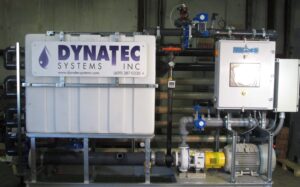FLEXOGRAPHIC INK WASTEWATER TREATMENT
A corrugated box manufacturer utilized conventional batch physical/chemical treatment for processing wastewater generated from the clean-up of flexographic ink wastewater. The system consisted of chemical coagulation followed by conventional flocculation. A deep bed filter was used to clarify and dewater the waste. The system was operator intensive and generated lots of sludge for disposal.

Solution:
A tubular non-clog membrane filtration system was installed to process the waste stream. The waste was pH adjusted to optimize the removal of copper and zinc. The waste was circulated through the filter for discharge and the contaminants were concentrated. The
concentrate of contaminants was reduced to 2% of the original volume. The system reliably produces high quality water with very little operator involvement.
Simple Mechanical Process:
The membrane filter is a mechanical system that allows clean water to pass through the filter while contaminants are rejected and returned to the waste holding tank. There are no chemicals required other than that which may be necessary for pH adjustment. Also, there is no sludge generated by the process. The system simply separates the contaminants from the water, whereas a chemical treatment system generates copious amounts of sludge that must be dewatered and disposed.
Unattended Operation:
Since this process is completely mechanical and not dependent upon chemical feed and the coagulation and flocculation process, the only operational requirement is to clean the membrane filters periodically. This is a simple process that involves less than one half hour of an operator’s time. A chemical treatment system requires ongoing adjustments of the chemical feed pumps, make-up of the chemical feeds, operation of the dewatering system and control calibration and adjustment. The chemical system tasks require continual attention on a daily basis, whereas the membrane filtration system requires attention only for cleaning.
Consistently High Quality Water:
The membrane filter forms a positive barrier to the flow of contaminants, producing continuous high-quality water without operator attention. The membrane system is not affected by variability of the waste stream. The purified water is suitable for reuse or sewer discharge.
Low Disposal Cost:
The mechanical separation produced by the membrane filter does not generate sludge. It simply separates the contaminants from the water and leaves those contaminants in a liquid phase. The amount of liquid concentrate is normally very small and it is, therefore, cost-effective to dispose of that concentrate as a liquid waste and thereby preclude the need to run and operate a solidification and de-watering operation.
Low Operating Cost:
The membrane filtration system will be the least expensive treatment system to operate. The cost of operation of a membrane filtration system is much less than a chemical treatment system.
Contact Dynatec Systems today to discuss your wastewater solution today.
